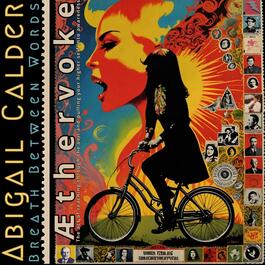
Æthervoke: Abigail Calder on LSD, Consciousness, & Unlocking the Higher Self
Support the show: https://www.paypal.me/Truelifepodcast?locale.x=en_US Buy Grow kit: https://modernmushroomcultivation.com/ 🎙️🎙️🎙️Abigail Calder "Welcome everyone to another insightful episode of TrueLife. Today, we have the honor of hosting Abigail Calder, a brilliant young mind at the forefront of psychedelic research. Abigail is not just a PhD candidate at the University of Fribourg, but a beacon of light in understanding the intricate dance between psychedelics and the human brain. With her work on neuroplasticity, particularly how LSD can reshape our neural pathways, Abigail is pioneering a new wave of science that connects the dots between consciousness, well-being, and the mystical experiences psychedelics can offer. But beyond her academic accolades, what truly sets Abigail apart is her passion for demystifying these complex subjects for everyone. Through her roles with the ALPS and MIND Foundations, she's been a bridge between the science lab and our living rooms, making psychedelic science accessible, understandable, and deeply human. Her dedication to exploring not just the highs but also the potential pitfalls of these substances shows a commitment to integrity and safety in science. So, without further ado, let's dive into a conversation that promises to enlighten, inspire, and perhaps even transform our understanding of ourselves. Please welcome, Abigail Calder." 1. Neuroplasticity and Consciousness: - How does the HRS, when applied to psychedelic therapy, interact with recent findings on neuroplasticity? Could it serve as a tool to measure the potential of psychedelics to not only treat but fundamentally alter the neural substrates of consciousness? "We're considering adding neuroplasticity metrics to the HRS to correlate with changes in consciousness." 2. Quantifying the Ineffable: - With recent studies suggesting psychedelics can enhance creativity and problem-solving, how can the HRS be adapted to quantify the ineffable aspects of these experiences, particularly in relation to the expansion of cognitive and linguistic capabilities? "We could introduce creativity-focused subscales or collaborate with psychologists to assess linguistic shifts. We could weave in poetry analysis or perhaps use the HRS to chart the colors of thought, capturing creativity's dance through words." 3. Therapeutic Revolution and Ethical Boundaries: - Given the latest research on psychedelics for treating conditions like depression, anxiety, and PTSD (e.g., studies from Johns Hopkins, Imperial College London), how does the HRS help navigate the ethical landscape of potentially "standardizing" or misinterpreting the deeply personal nature of these therapeutic experiences? - "The HRS should balance standardization with the narrative integrity of each individual's experience 4. Cultural Context and Universal Experience: - In light of research exploring the cultural variability of psychedelic effects (e.g., work by Brian Earp and colleagues), can the HRS be redesigned to reflect or respect the cultural nuances in psychedelic experiences, or does it inherently impose a universalist scientific framework? -We'd need to develop culturally sensitive extensions to the HRS while maintaining its core utility." 5. Altered States and Illness: - Recent breakthroughs in using psychedelics for terminal illness care (like the work of palliative care with psilocybin) suggest profound changes in attitudes towards death. How can the HRS contribute to understanding these shifts, and what does this mean for our conceptualization of illness and healing? We're looking at revising questions to capture shifts in existential attitudes related to illness." 6. Linguistic Evolution through Psychedelics: - With work like that of Robin Carhart-Harris on the "entropic brain," could the HRS be used to explore how psychedelics might lead to new linguistic forms or concepts, essentially creating a new "language" of consciousness? Imagine the HRS as a linguistic archaeologist, unearthing new dialects of consciousness shaped by the psychedelic experience, "The HRS might track novel expressions or concepts, potentially with linguists' input 7. Reality, Perception, and Quantum Consciousness: - Recent discussions at the intersection of quantum mechanics and consciousness (e.g., Anirban Bandyopadhyay's work on microtubules) raise questions about reality. How might the HRS be expanded or reinterpreted to study if psychedelics offer a glimpse into quantum aspects of consciousness? 8. Integration of Altered States into Daily Life: - Given research on microdosing (e.g., studies by James Fadiman), how might the HRS be used to study the integration of minor psychedelic experiences into everyday life, potentially altering our understanding of normalcy, productivity, and creativity? 9. Predictive Processing and Psychedelics: - With models like predictive processing gaining traction in neuroscience (Karl Friston's work), how does the HRS fit into or challenge these models when it comes to interpreting psychedelic experiences, particularly in terms of how they alter our predictive models of the world? 10. Ethics of Altered States: - As psychedelics move towards legalization and mainstream therapeutic use, how can the HRS inform ethical guidelines, especially regarding consent, autonomy, and the potential for psychedelic experiences to be misused or misunderstood in clinical settings? 11. Beyond Dualism: - With psychedelic research challenging the hard problem of consciousness, how can the HRS be utilized to explore non-dualistic interpretations of mind 1. Neuroplasticity and Consciousness: - "How do you envision the HRS evolving to measure not just the experience of psychedelics but also their potential to induce lasting changes in neural structures and consciousness?" 2. Quantifying the Ineffable: - "Given the challenge of measuring subjective, profound experiences, how could the HRS be adapted to better capture the creative or linguistic breakthroughs users might experience during psychedelic sessions?" 3. Therapeutic Revolution and Ethical Boundaries: - "In the context of psychedelic therapy becoming more standardized, how can the HRS ensure that the deeply personal aspects of these experiences are not lost or misinterpreted in clinical settings?" 4. Cultural Context and Universal Experience: - "How might we modify the HRS to reflect cultural differences in psychedelic experiences, or is there a risk that such modifications could compromise the scale's universality?" 5. Altered States and Illness: - "Can the HRS be instrumental in understanding how psychedelics shift perceptions of illness and mo...
From "TrueLife"


Comments
Add comment Feedback